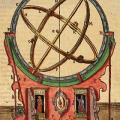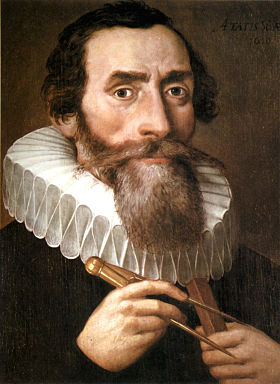395. Music of the Spheres: Johannes Kepler
Kepler combines Brahe's observations, Copernicus' astronomy, and Platonist metaphysics.
Themes:
• E.J. Aiton, A.M. Duncan, and J.V. Field, The Harmony of the World by Johannes Kepler (Philadelphia: 1997).
• W.H. Donahue (trans.), Johannes Kepler: New Astronomy (Cambridge: 1992).
---
• P.J. Boner, Kepler’s Cosmological Synthesis: Astrology, Mechanism and the Soul (Leiden: 2013).
• J.V. Field, Kepler’s Geometrical Cosmology (Chicago: 1988).
• O. Gingerich, The Eye of Heaven: Ptolemy, Copernicus, Kepler (New York, 1993).
• N. Jardine, The Birth of History and Philosophy of Science: Kepler’s A Defence of Tycho against Ursus (Cambridge: 1984).
• R. Martens, Kepler’s Philosophy and the New Astronomy (Princeton: 2000).
• A. Rothman, The Pursuit of Harmony: Kepler on Cosmos, Confession, and Community (Chicago: 2018).
• B. Stephenson, Kepler’s Physical Astronomy (New York: 1987).
• J.R. Voelkel, Johannes Kepler and the New Astronomy (Oxford: 1999).
Online resource: Kepler’s Collected Works
Less serious online resource: Marvin the Martian’s Illudium PU-36 explosive space modulator
Thanks to Thony Christie and Karl Galle for their help with this episode!







Comments
Musique des sphères/Music of the spheres
There is no philosophical notion without a factual referent, even if it is imaginary.
On the other hand, the perceptions of all kinds that generate our philosophical concepts are always interpretations that pass through the brain and are never, in this sense, 'real'.
The music of the spheres also refers to various modes of perception or interpretation, and the musical connotation refers to a musical perception, i.e. sound in the proper sense, which translates the more common visual perception of the celestial sphere.
Il n'y a pas de notion philosophique sans référent factuel, fût-t-il imaginaire.
D'autre part, les perceptions de toutes natures qui engendrent nos versions philosophiques sont toujours des interprétations qui passent par le cerveau et ne sont jamais, en ce sens, "réelles".
La musique des sphères renvoie elle aussi à divers modes de perception ou d'interprétation, et la connotation musicale à une perception musicale, c'est-à-dire sonore au sens propres, qui translate la perception visuelle plus commune de la sphère céleste.
gap alert
Are you planning to cover Athanasius Kircher in the southern europe part of the reformation series? Or, when you cover the scientific revolution?
Also, as we have covered the telescopists, we need also to cover microscopists (leeuwenhoek, hooke, swammerdam, grew, malpighi etc). Otherwise, gaps will be left.. :-)
There is a nice book on the impact of the discovery of the microscopic life on the early modern philosopy:
"The invisible world: early modern philosophy and the invention of the microscope", catherine wilson...
In reply to gap alert by mehmet
Kircher
Despite Kepler, the current series mostly ends at 1600 so Kircher would come later when I am doing a series (well, several series) on the 17th century. And yes I have heard about that book about the microscope, I will definitely look at it in due course! Thanks for the tips.
The pidcast
How can I put it accurately? I can't, but: I feel it in my fingers, I feel it in my toes... thanks and awe inside me, and so the feeling goes. For the joking too (you do joke, right?). Aĺl the best.
Add new comment